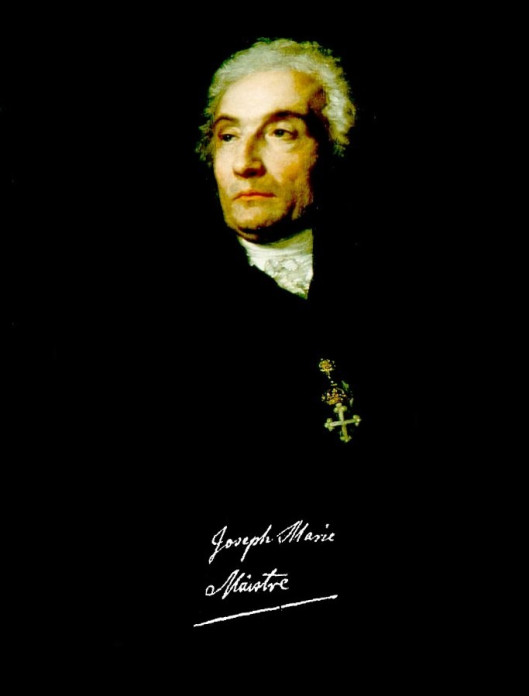
A figure who describes the thoughts of a true fascist was in the person of Joseph D Maistre who the great essays Isaiah Berlin argues was one of the first to write and articulate the fascist mood and outlook.
Maistre from Chambery France lived during the time of the french revolution in the late eighteenth and early nineteenth century when the old traditions and customs were being wiped away and the most pressing topic in the public conscience was how a man should be governed.
Sides were being picked in this debate and Maistre saw himself on the side of a Catholic reactionary against the Revolution of the philosophes.
He was an aristocrat, a man from the middle ages, a defender of the pope, friend of the hangman who opposed the revolution of rational, empiricism, liberalism and democracy.
Most historians and thinkers throughout the ages have written Maistre off as interesting but not important, a foolish man of the past fighting against the progress of history.
In Berlin’s essay on the Origins of fascism, he argues that Maistre’s writings were those of an ultra modernist. Born before his time, His thought was not of traditional conservatism. He didn’t argue from the place of the Roman church like Thomas Aquinas or blind faith in the statue quo but from history and the animal kingdom. What do you find when we study these things but blood and death.
This Berlin argues was the modern fascism paranoid world view that we wouldn’t see for another century.
Maistre was obsessed with the stupidity and wickedness of man, that the only solution was punishment, suffering and pain through society hierarchy with the executioner at the forefront.
There was no noble savage that Enlightenment figures like Rousseau described. Man is not born free, he is wicked and society is meant to curb his violent instincts.
The enemies of this hierarchal system are those who wanted to organize society on rationality, on written constitutions built by journalists, scientists, the supporters of the French revolution.
Maistre believed that these revolutionaries had a shallow understanding of reality. He thought a stable society is held together by irrational institutions. Like hereditary kingship, which logically makes no sense compared to choosing a ruler by the masses like democracies like Athens. but this tradition of the monarchy has withstood the test time of fifteen hundred years and Athen only a few hundred.
Authority needs to come from a place of no appeal. The second you start to question authority there is no rest. Man needs to submit to the nation and lose his personal identity completely, like a river that falls into the ocean and dissipates. The absurd idea of individual liberalism, motivated by self-interest only causes lawlessness and anarchy.
A desire for romantic self-sacrifice to the state to suffer and die with no interest in ones happiness, is the violent irritational goals of the pessimistic view of totalitarianism that came to life in the twentieth century.
